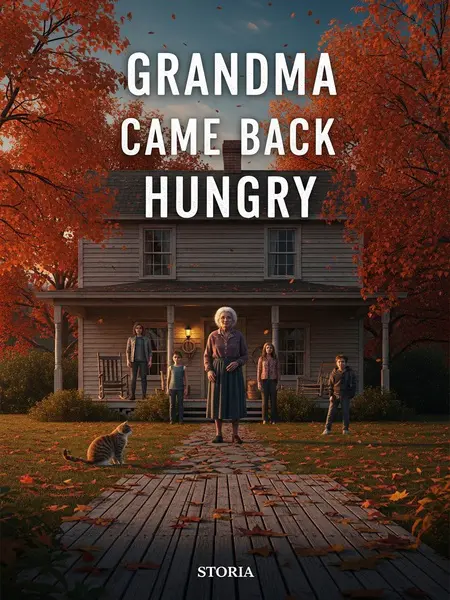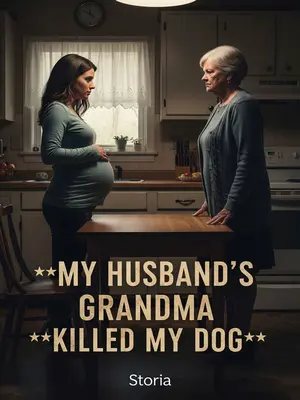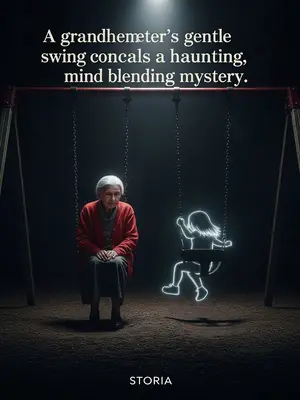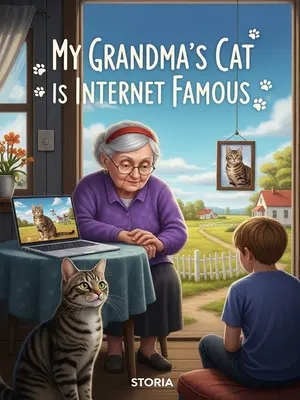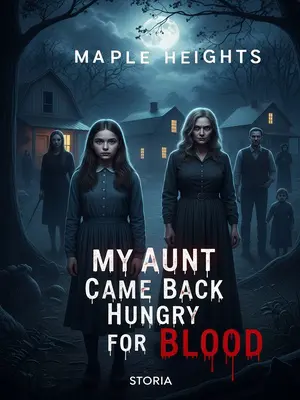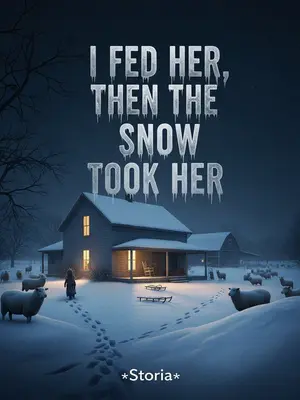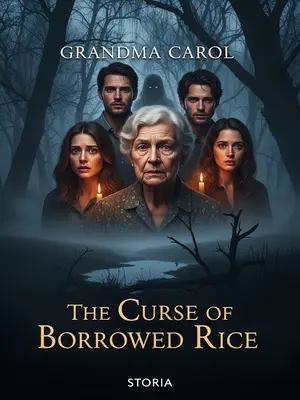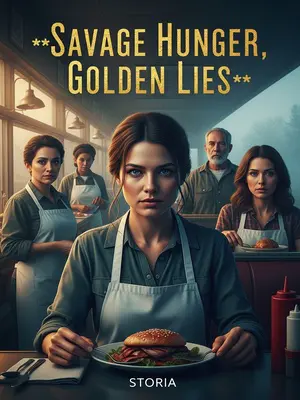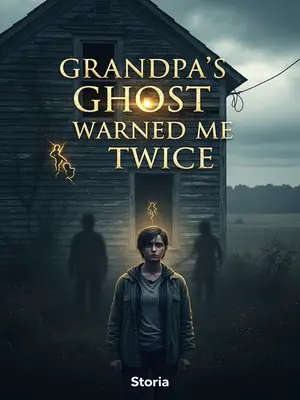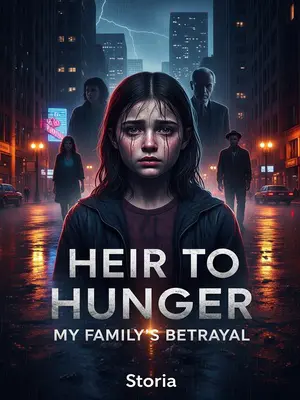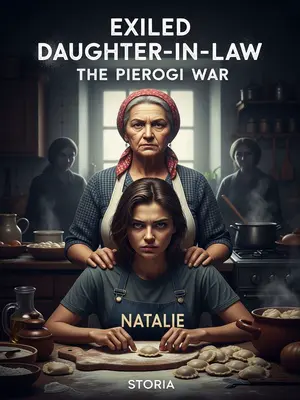Chapter 2: Rice, Folklore, and the Walking Dead
The slap echoed, sharp and sudden. Dad winced, and the neighbors across the street paused their raking to stare, faces a mix of curiosity and concern. It felt like the whole block was watching, waiting to see what would happen next.
Dad’s eyes turned red. His voice shook. “Mom...”
He reached out as if to comfort her, but pulled his hand back, unsure. You could see the struggle in his eyes—the tug-of-war between loyalty and fear.
“Isn’t it just walking on rice? I can walk, can’t I?” she said, her voice trembling with stubborn pride.
With that, Grandma trembled as she tottered out of the basket. She stepped onto the snow-white rice, one foot dragging, the other barely lifting, tears streaming down her face.
The rice crunched beneath her bare feet, the sound oddly loud in the hush. Each step seemed to cost her dearly, but she kept going, her jaw set, tears cutting clean tracks through the dust on her cheeks. The porch boards creaked under her weight, and for a second, I thought she might collapse. I held my breath, not sure what would happen next.
“All this fresh rice, such good grain, wasted. Wasting food on an old woman like me—God’s watching, you know. This is a sin.”
She muttered it under her breath, her voice heavy with old-country guilt. She shook her head, glancing skyward as if expecting a bolt of lightning to strike. The neighbors murmured among themselves, some nodding in agreement, others just looking uncomfortable.
As she spoke, Grandma had already walked several steps—just a little dust on the rice. Nothing weird. Nothing at all.
Everyone watched, waiting for something—anything—to happen. But there was no smoke, no sparks, no sign of anything unnatural. Just the sound of her feet dragging through the rice, and the collective exhale of a dozen worried neighbors.
Seeing this, the neighbors around us shot reproachful looks at Mom. Dad’s face went beet red. He scooped Grandma up and made a beeline for the door.
Mrs. Pritchard muttered something about wasting food, and old Mr. Jenkins shook his head, but nobody dared say anything out loud. Dad scooped Grandma up, his cheeks flushed with embarrassment, and made for the door as quickly as he could.
But Mom stopped him again. She gave Grandma a half-smile, but her eyes were sharp. “Mom, when did your legs get so strong?”
She said it with a half-smile, but her eyes were sharp. The question hung in the air, and for a second, nobody moved. Even the wind seemed to pause, waiting for Grandma’s answer.
Everyone was stunned. Only then did they remember Grandma’s half-paralyzed state. Everyone just stared, mouths open, like they’d forgotten she couldn’t walk.
A hush fell over the porch. I saw Aunt Linda’s mouth fall open, and even tough old Uncle Dennis looked uneasy. It was as if we’d all forgotten for a moment that Grandma wasn’t supposed to be able to walk at all, let alone cross a porch full of rice.
Mom stepped forward. “Mom, they say zombies have stiff bodies, their joints can’t bend. Can you bend down for me? Show us you’re still you.”
She said it softly, but there was steel in her voice. Mom knelt down, gesturing for Grandma to try. You could almost hear the neighbors holding their breath, waiting to see what would happen.
Grandma froze. She squinted, her cloudy eyes darting around.
For a moment, she just stood there, her hands trembling. The tension was so thick you could cut it with a butter knife. I felt my own heart pounding, my palms sweaty.
Just then, a sudden wind swept through the yard, filling everyone’s eyes with dust. I was short, so most of the grit blew right over my head, and I vaguely saw a dark shadow flicker by the gate. Then, the wind died down.
The screen door rattled, and the trees shivered. Everyone blinked, coughing and rubbing their eyes. Through the haze, I caught a glimpse of something—maybe the cat, maybe something else—darting past the gate. The wind died as quickly as it had come, leaving behind a strange hush.
With everyone watching, Grandma cautiously bent down and touched the ground. She even sneaked a glance at Mom out of the corner of her eye, half-defiant, half-afraid.
She moved slow, deliberate, as if testing each joint. Her fingers brushed the porch boards, and she looked up, half-defiant, half-afraid. Mom nodded, and the neighbors let out a collective sigh of relief, their shoulders relaxing all at once.
Seeing that Grandma wasn’t afraid of rice and could bend over, Mom clearly breathed a sigh of relief as she called everyone over.
Aunt Linda and Uncle Dennis rushed to help, and together, they eased Grandma inside. The neighbors drifted back to their own porches, some shaking their heads, others just grateful the drama was over—for now.
Everyone busied themselves washing and cleaning Grandma, stepping over a smoking sage bundle by the door to drive away bad luck. No one paid any attention to me.
The house filled with the smells of soap and burning sage. Aunt Linda scrubbed Grandma’s hands with warm water, while Mom tossed a handful of salt over her shoulder for good measure. The grown-ups were so focused on Grandma, they didn’t notice me crouching by the door, my nose twitching at the strange, acrid smoke.
I squatted on the spot where Grandma had touched the ground and saw a few black cat hairs there.
They glistened in the afternoon light, wiry and unmistakable. I reached out and picked one up, rolling it between my fingers. It was slick, almost oily, and it made the hairs on the back of my neck stand up. Something about it felt wrong, but I couldn’t say why.
Dad was overjoyed, saying he’d roast a ham that night and throw a big dinner for Grandma. The neighbors said Dad was a saint, and that Grandma was lucky to have him.
He clapped his hands, already talking about honey-glazed ham and scalloped potatoes. Mrs. Pritchard called over from her porch, telling Dad he was a saint, and Mr. Jenkins nodded in approval. The mood in the house lifted a little, everyone eager for a reason to celebrate.
Grandma was delighted to hear this, and she especially asked my Uncle Ray and Uncle Dennis to bring their kids over so she could spend time with them. Her eyes sparkled, and she smiled wider than I’d seen in years. She insisted that the whole family should be together, just like old times. She made a special point of inviting the cousins, her voice sweet and coaxing.
After a long discussion, Uncle Ray and Uncle Dennis reluctantly brought over two little girls, Annie and Maribel. It was late autumn, but they were still wearing dirty, threadbare pants, shivering in the cold wind.
The girls’ cheeks were red from the cold, and their hands were stuffed deep in their pockets. Their clothes looked like hand-me-downs from a thrift store, patched and faded. They clung to each other, eyes darting around the unfamiliar house, nervous but hopeful for a good meal.
Grandma glanced at them. “Why are you two so skinny? Looks like you’d break my teeth.”
Her voice was sharp, but there was a glint of mischief in her eye. The adults chuckled, and even Annie managed a small, embarrassed smile. It was the kind of joke Grandma used to make when she wanted to tease us into eating more.
Everyone cracked up at Grandma’s joke.
The room warmed with laughter, the tension from earlier fading just a little. Uncle Ray ruffled Annie’s hair, and Aunt Linda handed Maribel a threadbare blanket. For a moment, it almost felt like any other family gathering.
Dad helped Grandma into the living room and served her a bowl of pork stew. “Mom, freshly made, home-raised pork—cooked until it’s falling apart. Try some.”
